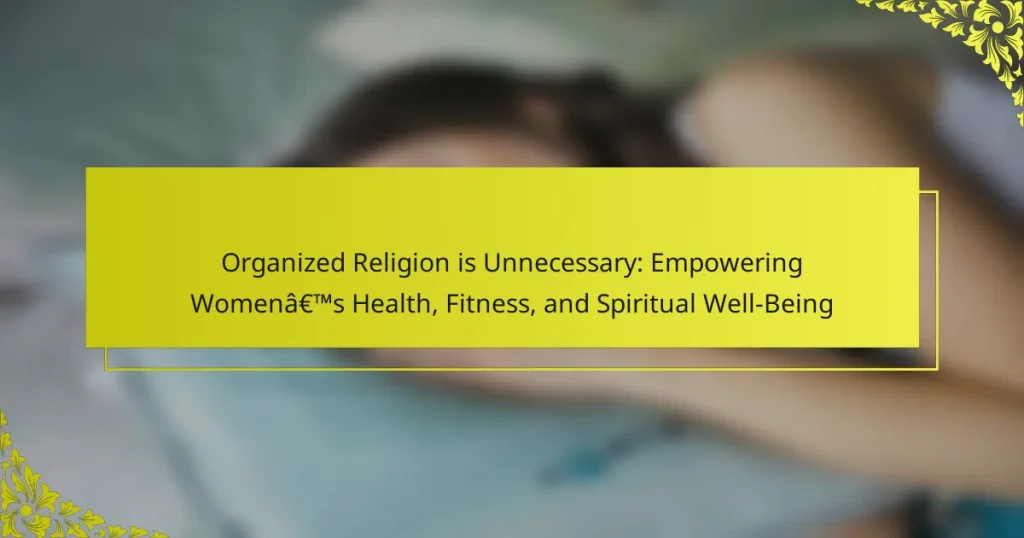Organized religion often imposes restrictions that can negatively impact women’s health and fitness. This article explores how empowerment through secular approaches promotes holistic well-being and encourages fitness independence. It highlights unique practices that enhance physical health and mental well-being, while also discussing the benefits of secular environments for women’s health journeys. Finally, it examines how women can cultivate spiritual well-being outside of organized religion through personal practices and community connections.

How does organized religion impact women’s health and fitness?
Organized religion can hinder women’s health and fitness by imposing restrictive norms. These norms may limit women’s access to physical activities and healthcare. Empowerment through secular approaches promotes holistic well-being, encouraging physical fitness and mental health. Studies show that women engaged in non-religious communities report higher levels of physical activity and overall health satisfaction.
What are the negative effects of religious constraints on women’s physical activity?
Religious constraints can significantly hinder women’s physical activity by imposing restrictions on attire, social interactions, and participation in certain environments. These limitations can lead to reduced physical fitness, increased stress, and lower overall well-being. For example, women may feel discouraged from exercising in public spaces or wearing appropriate athletic clothing due to cultural or religious norms. As a result, this can diminish opportunities for social engagement and community support, further exacerbating health disparities.
Can spirituality enhance women’s fitness outcomes without organized religion?
Spirituality can enhance women’s fitness outcomes without organized religion by fostering a sense of purpose and self-awareness. Practices like mindfulness and meditation improve mental health, which directly correlates with physical performance. Research shows that women who engage in spiritual practices report higher motivation and resilience in fitness routines. Additionally, community support found in spiritual groups can provide encouragement and accountability, further boosting fitness goals.

What universal health benefits can women gain from fitness independence?
Women can gain significant health benefits from fitness independence, including improved physical health, mental well-being, and enhanced self-esteem. Engaging in fitness activities promotes cardiovascular health, strengthens muscles, and boosts immunity. Regular exercise is linked to reduced anxiety and depression, fostering emotional resilience. Furthermore, fitness independence encourages women to take control of their health journeys, leading to increased motivation and empowerment. This holistic approach nurtures not only physical fitness but also spiritual well-being by fostering a sense of purpose and community.
How does regular exercise improve mental health for women?
Regular exercise significantly enhances mental health for women by reducing stress and anxiety. Physical activity releases endorphins, which are natural mood lifters. Studies show that women who engage in regular exercise report lower levels of depression and improved emotional well-being. Additionally, exercise fosters social connections, which are crucial for mental health. Engaging in group activities promotes a sense of community and belonging, further empowering women’s overall health and spiritual well-being.
What role does nutrition play in women’s fitness and well-being?
Nutrition plays a crucial role in women’s fitness and well-being by providing essential nutrients that support physical health and mental wellness. A balanced diet enhances energy levels, promotes muscle recovery, and maintains a healthy weight.
For example, adequate protein intake is vital for muscle repair, while complex carbohydrates fuel workouts. Additionally, micronutrients like calcium and iron are essential for bone health and energy production.
Research indicates that women who prioritize nutrition experience improved mood and reduced stress levels, contributing to overall well-being. A study found that nutrient-rich diets correlate with higher self-esteem and better body image among women.
In summary, nutrition is foundational for empowering women’s health, fitness, and spiritual well-being, enabling them to thrive physically and emotionally.

What unique fitness practices empower women outside of religious structures?
Unique fitness practices that empower women outside of religious structures include yoga, martial arts, community fitness classes, and outdoor adventure activities. These practices promote physical health, mental well-being, and social connections. For example, yoga enhances flexibility and mindfulness, while martial arts build confidence and self-defense skills. Community classes foster inclusivity and support networks, and outdoor activities encourage connection with nature. Each approach focuses on individual empowerment and holistic wellness, highlighting a unique attribute of self-discovery and personal growth.
How do alternative wellness communities support women’s health?
Alternative wellness communities significantly enhance women’s health by fostering supportive environments. These communities focus on holistic approaches, integrating physical fitness, mental well-being, and spiritual growth.
Women benefit from shared experiences and resources, which promote empowerment and self-care practices. Programs often include fitness classes, mindfulness workshops, and nutritional guidance tailored to women’s unique health needs.
Research indicates that participation in these communities can lead to improved mental health outcomes, reduced stress levels, and a stronger sense of belonging. This collective support is crucial for women seeking to prioritize their health outside traditional frameworks.
By emphasizing collaboration and shared goals, alternative wellness communities create spaces where women can thrive, ultimately enhancing their overall health and wellness journey.
What are the benefits of group fitness classes for women?
Group fitness classes offer numerous benefits for women, including enhanced physical health, social support, and improved mental well-being. These classes promote regular exercise, which can lead to weight management and increased strength. Social interaction within these settings fosters community and accountability, encouraging consistent attendance. Additionally, group classes can reduce stress and anxiety, contributing to better overall mental health. Engaging in a supportive environment empowers women to prioritize their fitness and well-being, ultimately leading to a more balanced lifestyle.
What innovative fitness trends are popular among women today?
Innovative fitness trends popular among women today emphasize holistic approaches to health and well-being. These trends include group fitness classes that foster community, mindfulness practices like yoga and meditation, and high-intensity interval training (HIIT) that maximizes efficiency. A unique attribute is the rise of fitness technology, such as wearable devices that track health metrics, enhancing personal accountability and motivation. Additionally, outdoor workouts and nature-based activities are gaining traction, promoting mental well-being alongside physical health. These trends reflect a shift towards empowerment and a balanced lifestyle.

What rare insights exist about women’s health and fitness in secular environments?
Secular environments can foster women’s health and fitness by promoting autonomy and diverse approaches to well-being. Research indicates that women in secular settings often experience greater freedom to explore fitness modalities that resonate personally, leading to enhanced engagement and sustainability. Unique insights reveal that secular frameworks encourage inclusive community support, allowing women to connect and share experiences without religious constraints. Additionally, secular perspectives often prioritize evidence-based health practices, empowering women to make informed choices about their fitness and overall health.
How do cultural perceptions of fitness differ for women in non-religious settings?
Cultural perceptions of fitness for women in non-religious settings often emphasize autonomy and inclusivity. Unlike religious contexts, which may impose specific ideals, non-religious environments encourage diverse expressions of fitness. Women experience greater freedom in choosing activities that resonate with their personal values and lifestyles. This empowerment fosters a sense of community and support among women, enhancing their overall health and well-being. Additionally, non-religious settings often prioritize body positivity and mental health, promoting holistic approaches to fitness that extend beyond physical appearance.
What are the challenges faced by women pursuing fitness in conservative communities?
Women in conservative communities face significant challenges in pursuing fitness, including cultural restrictions, limited access to facilities, and societal expectations. These factors can hinder their ability to engage in physical activities and prioritize health. The stigma around women exercising in public spaces may discourage participation, impacting their overall well-being. Additionally, traditional views on gender roles often prioritize family responsibilities over personal health, further complicating their fitness journeys.

How can women cultivate spiritual well-being without organized religion?
Women can cultivate spiritual well-being without organized religion through personal practices, community connections, and self-reflection. Engaging in activities like meditation, yoga, and nature walks fosters inner peace and mindfulness. Building supportive networks with like-minded individuals enhances emotional health and spiritual growth. Journaling and creative expression can clarify personal beliefs and values, leading to deeper self-awareness. Exploring diverse philosophies and traditions enriches spiritual understanding while maintaining individual autonomy.
What are effective practices for self-empowerment in health and fitness?
Effective practices for self-empowerment in health and fitness include setting personal goals, cultivating a supportive community, and prioritizing self-care. Establish specific, measurable objectives to track progress. Engage with like-minded individuals to foster motivation and accountability. Integrate practices such as mindfulness and balanced nutrition to enhance overall well-being.
How can mindfulness and meditation enhance women’s fitness journeys?
Mindfulness and meditation can significantly enhance women’s fitness journeys by promoting mental clarity and emotional resilience. These practices help reduce stress, which can hinder physical performance and recovery. Regular mindfulness techniques lead to improved focus during workouts and foster a positive mindset, encouraging consistency in fitness routines. Additionally, women often experience unique challenges in their health journeys; incorporating mindfulness can empower them to navigate these hurdles with greater confidence and self-awareness.
What are the best practices for integrating fitness into daily life?
Integrating fitness into daily life enhances women’s health and spiritual well-being. Start by setting realistic goals that fit your schedule. Incorporate physical activity into daily routines, such as walking during breaks or using stairs. Join community fitness groups to foster social connections and accountability. Prioritize consistency over intensity to build sustainable habits. Lastly, combine fitness with mindfulness practices, like yoga, to promote holistic health.
What common mistakes should women avoid in their fitness routines?
Women should avoid common mistakes in fitness routines such as neglecting strength training, ignoring proper nutrition, and lacking consistency. Prioritizing cardio over strength can hinder muscle development and metabolism. Failing to fuel the body with adequate nutrients leads to fatigue and poor performance. Inconsistency disrupts progress and motivation. Additionally, not setting realistic goals can result in frustration. Focusing on holistic health rather than just aesthetics fosters a sustainable fitness journey.
How can women create a supportive community for health and fitness?
Women can create a supportive community for health and fitness by fostering inclusive environments that prioritize shared goals and encouragement. Establishing local groups or online platforms allows women to connect, share experiences, and motivate each other. Organizing regular fitness events or workshops can enhance community engagement and promote healthy habits. Additionally, incorporating wellness education and discussions about spiritual well-being can deepen connections and empower participants. A unique attribute of such communities is their ability to provide emotional support, which can significantly enhance individual health journeys.




